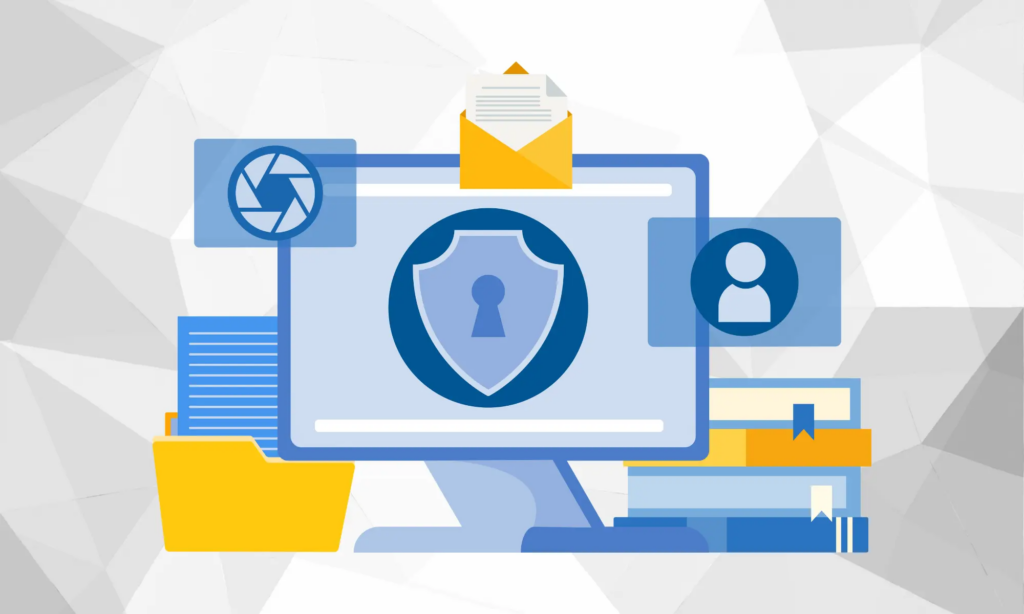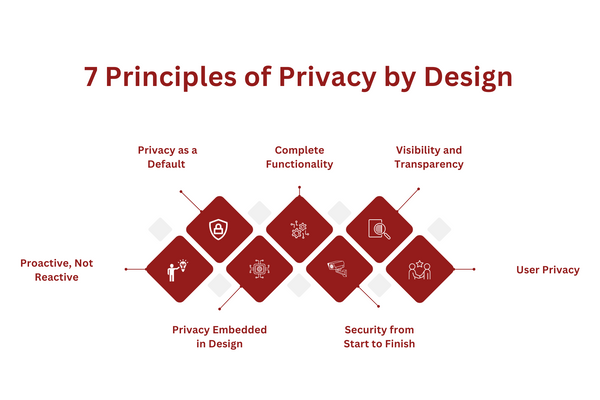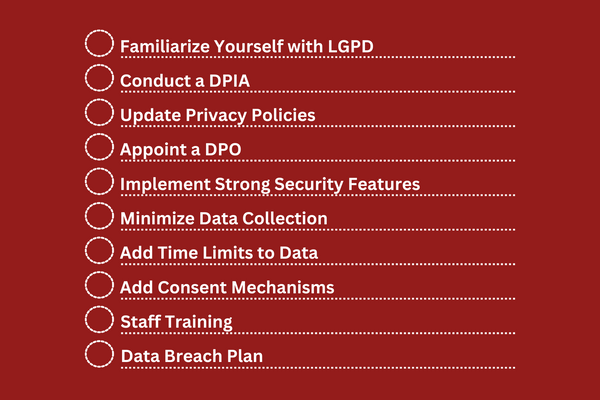
If your business is subject to the data protection regulations of the LGPD, you must implement privacy by design in your data processing methods to avoid potential fines and other consequences.
Privacy by design starts at the very start of your business model and emphasizes data privacy for consumers from start to finish. Using this strategy is not only required by the LGPD but has numerous benefits for your business.
Read on to learn how the LGPD defines Privacy by Design, its seven principles, and how your business can implement this strategy effectively.
Let’s get started.
Key Takeaways
The LGPD defines Privacy by Design as implementing adequate security, technical, and administrative measures to protect consumers’ data from breaches, loss, or alteration.
Your business can implement Privacy by Design by researching relevant data protection regulations, conducting DPIAs, updating privacy policies, appointing a DPO, implementing robust security features, minimizing data collection, adding time limits to data, adding consent mechanisms, staff training, and data breach plans.
Privacy by Design is required by the LGPD and GDPR but not by other major laws like the CCPA.
Privacy by Design LGPD Meaning
Privacy by Design LGPD Meaning.png

Article 46 of the LGPD defines privacy by design as “security, technical and administrative measures capable of protecting personal data from unauthorized access and accidental or unlawful destruction, loss, alteration, communication or any form of improper or illegal treatment.”
Your business must provide sufficient privacy and data protection for all consumers to comply with the LGPD. To measure the sufficiency of the measures your business has in place, the LGPD sets specific technical standards your business must meet.
The final significant piece of the LGPD’s definition is the full scope of applicability. Your business’s measures must be present “from the product or service conception phase until its execution.”
7 Principles of Privacy by Design
7 Principles of Privacy by Design.png

There are seven essential principles to ensure full compliance with not only the LGPD but other regulations like the GDPR as well. Follow these principles to serve as guidelines when implementing privacy by design.
Proactive, Not Reactive
The first principle is about anticipating events before they happen rather than just reacting to them afterward. The proactive principle ensures your business has adequate data security and privacy measures to prevent breaches rather than respond to them.
Your business should implement processes to protect data subjects and their information, anticipating the specific threats that could pose a risk.
Privacy as a Default
This principle ensures that consumers’ data is protected by default, even if they take no data protection measures themselves.
Your business should include your system’s highest level of privacy and security from the beginning in every data processing operation.
Privacy Embedded in Design
This principle demonstrates the fundamental concept of privacy by design. Privacy for your consumers and their personal data should be embedded into your systems and processes from the beginning.
Rather than implementing additional privacy or security features, they will already be an integral part of your business’s data processing services.
Complete Functionality
The functionality principle is about not sacrificing ease of use or any guarantee of privacy to guarantee the other. Your business must find a way to ensure privacy for all data subjects without compromising your ability to provide your good or service.
Any issues involving functionality or privacy should be resolved without sacrificing quality on either side to uphold this principle.
Security from Start to Finish
Data processing involves several steps: collection, storage, accessing, transferring, and finally, deletion. This principle of privacy by design ensures your business maintains the highest level of security for consumers’ data throughout the entire process.
As soon as your business collects data from a consumer, their information should be secure until it is properly deleted from your system. Ensuring end-to-end security for your consumers will help you gain their trust and comply with major data protection regulations, such as the LGPD.
Visibility and Transparency
Your business’s security processes and measures are essential and will help you gain consumers’ trust if they can see them. The transparency principle is all about being open and disclosing your business’s data processes with complete visibility.
By showing how and why you collect consumer data and how you protect it, consumers will be more likely to trust your business. This will also allow you to easily prove your compliance to data protection authorities as well.
User Privacy
The final principle of privacy by design represents the need to put your consumers first. The LGPD and other data protection regulations provide certain data subject rights to consumers, granting them control over their information.
Your business should clearly explain consumers’ rights over their data, have clear cookie and privacy policies, and always obtain explicit consent before any data processing begins.
If you respect your consumers’ rights and privacy, you will gain their trust and an edge over competitors that don’t do this.
Steps for Privacy by Design LGPD
Steps for Privacy by Design LGPD.png

To successfully implement privacy by design, I have compiled a list of simple steps for your business to follow.
This will ensure your compliance with the LGPD and other data regulations, which in turn will improve your business’s reputation for data security and privacy. Here are some great ways to implement privacy by design into your business:
Familiarize Yourself with LGPD
The first step in implementing adequate privacy by design is to familiarize yourself with the LGPD and its requirements.
By following the guidelines and specific standards in the LGPD, your business can create quality data security protocols and avoid non-compliance penalties.
Conduct a DPIA
A Data Protection Impact Assessment (DPIA) can help your business identify areas of risk or weaknesses in your system. By finding these risks early on, you can take corrective action and minimize any possibilities of a breach.
When your business adds regular DPIAs to your plan, you can continuously monitor and improve data protection measures.
Update Privacy Policies
Keeping your privacy policies up-to-date is super important when it comes to implementing Privacy by Design under the LGPD.
This policy informs consumers about how their personal data will be collected, stored, and used. It also details customers’ rights concerning their own data while providing clear steps for exercising those rights.
However, static or outdated privacy policies aren’t enough because of the fluid nature of digital technologies and evolving legal requirements, especially with regulations like LGPD.
Policies must adapt in line with new laws and technological advancements involved in customer information collection methods.
Appoint a DPO
Another significant step your business can take is to appoint a data protection officer (DPO). The role of a DPO is to create and ensure all data processing protocols align with current regulations.
In some cases, a DPO is mandatory, but even if it isn’t, it still provides an essential layer of compliance in your business.
Implement Strong Security Features
When you proactively create security measures in your business plan, you can prevent potential cyber-attacks or leaks of your customer’s data.
Your business can utilize data compliance solutions and safe storage and disposal to create the highest data security standard for your consumers.
Minimize Data Collection
Minimizing data collection means limiting the personal information you gather from users to only what is absolutely necessary for your business operations.
This approach lessens potential damages in case of a breach and reduces the complexity of management, storage, and protection efforts associated with massive sets of sensitive customer data.
Add Time Limits to Data
In addition to minimizing the amount of data you collect, your business should also practice time limits for storing data and disposing of data when no longer needed.
By safely and properly disposing of data after a set time, you minimize the risk of exposing consumers’ personal information.
Add Consent Mechanisms
Adding consent mechanisms is crucial for compliance with the LGPD. Before collecting and processing personal data, businesses should obtain explicit permission from their consumers.
This involves clearly stating what information will be collected, how it will be used, and how long it will stored.
Furthermore, a mechanism should also exist where customers can easily change preferences regarding data collection whenever they wish — either by deleting all prior consents or amending specific parts of them.
Staff Training
Staff training is a critical part of implementing Privacy by Design and complying with LGPD. Employees should be well-versed in privacy laws and protocols for data handling procedures like processing or storing customer information securely and ethically.
They need to understand the potential risks associated with breaches as well as their role in maintaining compliance within your organization.
Properly trained staff are better equipped to avoid violations, respond effectively if an issue arises, and ultimately serve to uphold high-security standards, which foster trust between businesses and customers.
Data Breach Plan
It is always best to focus on preventing data breaches before they happen. However, your business can not eliminate the risk of a breach completely. You should always have effective data breach response plans in place.
Captain Compliance can help your business create data breach plans. Our team of professionals at Captain Compliance offers a full suite of services and compliance solutions to ensure your business is well-prepared for any situation.
Privacy by Design in Other Data Privacy Laws
Privacy by design is defined differently by different regulations. While there is some overlap, if your business is subject to more than one regulation, it is vital to know all applicable requirements. Other data privacy laws define privacy by design as follows:
General Data Protection Regulation (GDPR)
Similar to the LGPD, the GDPR also requires that businesses implement privacy by design. Your business must have effective technical and security measures for data protection interlaced with creation, supply, collection, and disposal practices.
California Consumer Privacy Act (CCPA)
The CCPA also emphasizes privacy by design. Under the CCPA, businesses must provide consumers with a clear and conspicuous link on their website titled “Do Not Sell My Personal Information” that allows users to opt out of the sale or sharing of their personal data.
Additionally, businesses are required to offer an option for consumers to limit the use and disclosure of their sensitive personal information. This means that users have control over how their sensitive data is used beyond just opting out of sales.
Privacy by design in relation to CCPA also includes a focus on data minimization. Businesses should only collect and retain personal information necessary for fulfilling legitimate business purposes specified at or before collection.
Other Countries
Other data protection laws don’t mention privacy by design explicitly but have requirements that closely resemble its principles. However, implementing Privacy by Design can help you comply with most other compliance laws.
In general terms, privacy by design aims at embedding privacy considerations into the design of systems and processes from their very start rather than just addressing them as an afterthought.
It involves taking proactive measures such as assessing risks related to data processing activities upfront and incorporating appropriate safeguards within system architectures.
By adopting a proactive approach based on concepts like minimization of data collection/storage/processing alongside strong technical controls – businesses not only enhance customer trust but also mitigate potential legal/regulatory compliance issues.
Closing
Privacy by design is crucial for your business to comply with major data protection laws like the LGPD, GDPR, and CCPA. By implementing data privacy and security into the very foundation of your business, you ensure a high standard of data protection for all your consumers.
To successfully incorporate privacy by design into your business and avoid penalties and fines, our team of compliance professionals is here to help. At Captain Compliance, we have compliance experts offering a full suite of compliance services for your business.
Let us help your business implement privacy by design to comply with the LGPD and any other relevant data protection laws. Get in touch today!
FAQs
How does Privacy by Design build trust?
You build trust by showing consumers your business’s dedication to data security and protecting their information by integrating privacy into your business’s very foundation.
Here is a list of the best cybersecurity services
How does Privacy by Design benefit businesses?
Privacy by Design shows consumers your commitment to securing and protecting their data clearly and transparently. You will gain consumer trust and comply with data regulations, avoiding large fines and penalties.
Learn what the fines for LGPD non-compliance are here
What are the main elements of Privacy by Design?
The seven principles of Privacy by Design are proactive, not reactive, privacy as a default, privacy embedded in design, complete functionality, security from start to finish, visibility and transparency, and user privacy.
Want help implementing these privacy by design principles? Get in touch with us today
Is Privacy by Design legally required?
Major data protection laws like the GPDR and LGPD legally require businesses to incorporate Privacy by Design.
Want more resources of compliance? Check out our education page for hundreds of compliance articles